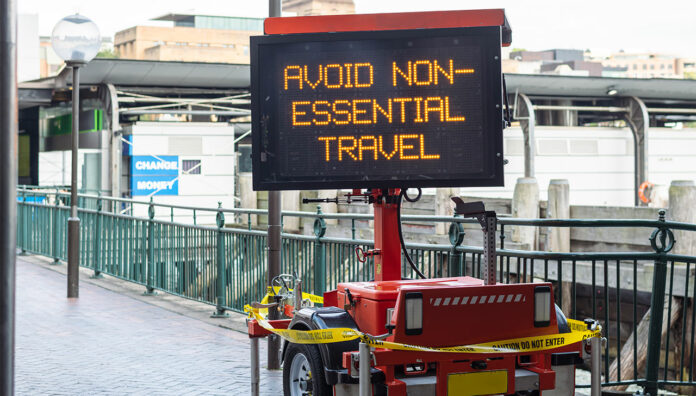Pharmacists and other essential workers in Sydney’s Fairfield Local Government Area must submit to regular COVID-19 testing, as the lockdown in Greater Sydney is extended by at least 2 weeks.
Fairfield LGA-based essential workers who work outside the area must submit to a COVID-19 test every 3 days, regardless of symptoms, New South Wales Premier Gladys Berejiklian announced yesterday.
Workers must provide evidence of the test, for example an SMS or email, upon request by their employer or a police officer.
Asymptomatic workers who are tested as part of this new program do not need to self-isolate until they receive a negative result. However, if symptoms develop at any time, they should get re-tested immediately and isolate until a negative result is received.
If pharmacies in Greater Sydney have staff who live in the Fairfield LGA, including locums or workers delivering stock, test results must be checked.
‘You are allowed to ask a person who is at your premises to show you proof that they have had a COVID-19 test in the past 72 hours,’ NSW Health told AP today.
‘This applies to all people, including employees, contractors and other service providers who work at your premises and live in the Fairfield local government area.’
For those in more regional locations, if a worker presents to your pharmacy from Greater Sydney, 7-day testing results must be provided.
Meanwhile, authorities in Melbourne are increasingly concerned at the spread of the Delta variant.
Victoria reported 7 new COVID-19 cases today, including 4 in an apartment block visited by 2 removalists from Sydney who were infectious at the time. The same removalists also travelled to South Australia.
Inside Fairfield LGA
Fairfield Heights-based pharmacist Ashur Menashi MPS told Australian Pharmacist many of his patients were worried about catching the virus.
With large households, a significant proportion of essential workers and 75% of residents in the region speaking a language other than English at home, conditions are ripe for spreading.
‘Everyone is scared and feels inconvenienced,’ Mr Menashi said. ‘We even had a case at one of our stores and [people were] calling up to ask if it is safe to come in.’
Mr Menashi said many of his older patients, in particular, struggle to understand the often-changing restrictions.
‘I tell them what [NSW Premier] Gladys [Berejiklian] has told us to do,’ he said.
‘Stay home unless you really need to [go out]. If you need anything from us, we’re happy to deliver it to you.’
Language barriers add another layer of complexity, but Mr Menashi finds ways to get the safety messages across.
‘We use hand signals or point to masks and things like that,’ he said.
‘If we have someone in the store who can speak their language, we’ll get them.’
Some people in the area are afraid to go to work because they are caring for elderly relatives and don’t want to bring the virus home with them, Mr Menashi said.
But the new testing rule caused chaos at local centres last night, with people queuing for hours.
Fairfield Mayor Frank Carbone said many people who wanted to get tested couldn’t afford to wait so long.
‘These are doctors and nurses, people that help our community, they work far and wide and these are essential workers,’ he said.
Addressing the concerns today, Ms Berejiklian said:’ We accept people had to wait a long time, it happened in the Northern beaches too’.
‘If you’re an essential worker who has no symptoms, you can go to a clinic closer to your workplace to take the pressure off,’ she added.
NSW community pharmacists to vaccinate
The PSA welcomed the news that local pharmacies across NSW will be permitted to vaccinate their communities against COVID-19.
NSW Branch President Chelsea Felkai said the state has almost 5,000 skilled, trusted and experienced pharmacist vaccinators who are keen to support their communities.
‘At a time when we are encouraging NSW residents to stay local, local pharmacists are the obvious choice,’ she said.
‘Local pharmacists can target at-risk Australians, particularly the elderly who may be hesitant to commute to or queue at hubs for extended periods of time.’
Community pharmacists can also reduce the rate of ‘no shows’ by making it easier and more convenient to get vaccinated, Ms Felkai said, and can reduce wastage by managing their appointments.
Mr Menashi agreed that allowing pharmacists to vaccinate would be a big help to the community.
‘There’s only a limited number of people who can administer right now,’ he said.
‘And we’re not getting [people] vaccinated quickly enough, it looks like, from what’s happening.’
The Australian Technical Advisory Group (ATAGI) on Immunisation also updated advice this week around the AstraZeneca vaccine in light of the outbreak.
‘In the context of a COVID-19 outbreak where the supply of Comirnaty (Pfizer) is constrained, adults younger than 60 years old, who do not have immediate access to Comirnaty (Pfizer), should reassess the benefits to them and their contacts from being vaccinated with AstraZeneca, versus the rare risk of a serious side effect,’ an ATAGI statement outlined.



 John Jones MPS, pharmacist immuniser and owner of My Community Pharmacy Shortland in Newcastle, NSW[/caption]
John Jones MPS, pharmacist immuniser and owner of My Community Pharmacy Shortland in Newcastle, NSW[/caption]


 Debbie Rigby FPS explaining how to correctly use different inhaler devices[/caption]
Debbie Rigby FPS explaining how to correctly use different inhaler devices[/caption]




 Professor Sepehr Shakib[/caption]
Professor Sepehr Shakib[/caption]

 Lee McLennan MPS[/caption]
Lee McLennan MPS[/caption]
 Dr Natalie Soulsby FPS, Adv Prac Pharm[/caption]
Dr Natalie Soulsby FPS, Adv Prac Pharm[/caption]
 Joanne Gross MPS[/caption]
Joanne Gross MPS[/caption]





